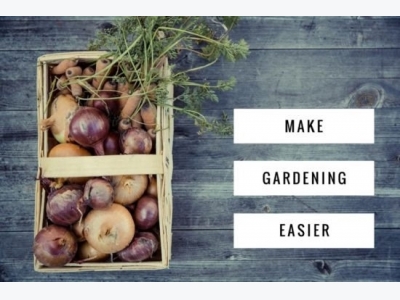How To Make Gardening Easier

Gardening is fun, healthy, and a smart way to enhance the quality of the food your family eats and the beauty of your indoor and outdoor spaces. Sometimes, though, gardening can be a lot of work. Unless, of course, you garden smart and do things the thoughtful, easy way.
Buy Quality Gardening Supplies
The tools you use, the extras you add, and the other supplies you bring in to help you garden should be of the best quality you can find and afford. Cheap tools break, wear out, and often cause more problems than they're worth. Those low-cost seeds you purchased may have low germination rates, be of weak stock, or otherwise disappoint. The soil you got at bargain prices may be low in nutrients, infested with weed roots and seeds, or have other issues.
Try to find the right tool for the job and to buy the best tools you can find. High-strength steel, lifetime guarantees, and quality workmanship on the handles are a must. Most of the time, tools purchased from smaller, more local hardware stores and gardener's outlets will have better workmanship and materials than will the mass-produced items of low quality materials from big box outlets.
Great seeds start from quality plants. If you don't save your own, make sure yours come from a trusted source. Local gardening swaps and seed exchanges are a great place to start. Well-known brands of organic and long-running stock with local sourcing are also a good bet.
All gardeners know that without good soil, your garden will never be its best and will always bring trouble. Use only quality compost, well-vetted manure, and nice, dark, locally-sourced, weed-free soil.

Grow and Garden Simply
Grow exotic plants that require a lot of attention separately from your garden or in small quantities. Concentrate the bulk of your garden on things that you regularly eat, store, or use. Edibles that you and your family enjoy, vegetables for those special recipes, and flowers you enjoy having grace your table should be the staple, the foundation of your garden. Leave the exotics to others or to small areas that can be easily controlled.
Yes, having that latest, greatest tomato might be the talk of the town. But, so will it be when the third of your garden you devoted to it becomes a barren wasteland, because you didn't have the time to properly care for those plants.
Use Vegetable Varieties and Companions to Your Advantage
A variety of plants can be a big advantage. One or two failing means little if the other 98 are doing well. Variety also allows you to use companion planting to bolster your results. Put carrots with onions and tomatoes, add potatoes to beans and peas. Add variety and use that to create companionable areas in your garden so everything works in harmony.
Avoid Labor Intensive Plants
Plant mostly easy-to-grow vegetables, flowers, and other plants. Avoid the plants that are tough to grow, require a lot of attention, or otherwise aren't an easy fit for your desires. Grow them in small quantities or not at all.
Garden with the Growing Seasons
Finally, don't force plants. Use the seasons as they are naturally meant to be grown. Planting the wrong plant at the wrong time only leads to trouble. At the same time, use timing to spread your plants out for growth rates and harvest. Plant the longer-growing plants later or earlier so that the faster ones don't come to fruit at the same time. Spread them out to both lengthen your harvest season and make things easier on yourself.
Everything has a balance, everything has a pace. Use the right ingredients, the right timing, and the right setting and you'll find that gardening is enjoyable and easy.
Related news
 How to Grow Lamium
How to Grow Lamium Looking for a fast-growing, attractive ground cover for shady areas? Consider lamium (Lamium maculatum), sometimes known as spotted dead nettle.
 How to Make a Raised Bed Vegetable Garden
How to Make a Raised Bed Vegetable Garden Raised gardening beds have many benefits when growing your own food. Don't miss these tips on making a raised vegetable bed.
 How To Make Your Own Raised Bed Soil
How To Make Your Own Raised Bed Soil Don't want to spend too much money on commercial soil? Make good grade soil yourself using this guide.